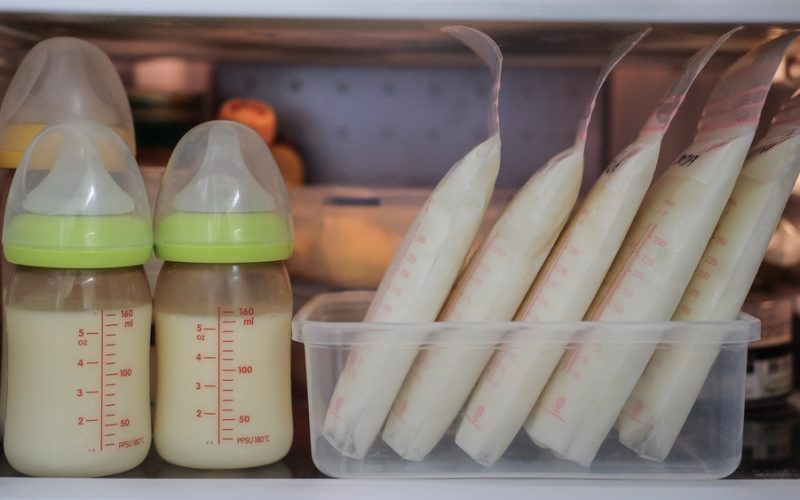- HOME
- Breastfeeding
- How to Avoid Breastfeeding Problems
How to Avoid Breastfeeding Problems?
18 Handy Breastfeeding Tips
If you are wondering how to avoid breastfeeding problems, here are the 18 do's and don'ts - the tried and tested breastfeeding tips that are guaranteed to make you a breastfeeding guru!
1. Start Breastfeeding your Newborn Baby Immediately after Birth.
Breastfeed with a gap of maximum two hours. Even if the flow of the breastmilk appears to be slow or you feel that it is blocked, keep on trying. The more you try to get the hang of it in the first 7 to 10 days, the easier will it get for you. You can take help from our 8 proven ways to increase breast milk.
2. Say YES to Warm Baths and Massages.
Breastfeed your baby after having a warm bath as it improves your milk flow. This is the same reason why you should first gently massage your breasts before starting a feeding session.
3. Search for Peace - Internal & External
Ask for privacy when you need to breastfeed your newborn baby. Turn off the TV and put the cellphone away. Let the baby feel the connection. If you are in a public place, find a corner that is not flooded with people or noise. This is not the time to welcome breastfeeding tips from strangers.
If you want to know how to avoid breastfeeding problems, start with not worrying about it. Panicking and feeling stressed out will only make things worse. Study suggests that your baby can feel mother's uncomfortable vibes. This is not the time to think about the negative things happening in life or to worry about the future. Just relax and let the goodness flow towards your baby.

4. Don't wait for the baby to cry.
Never delay your baby’s feeding time just because your baby is not crying for his/her meal. Making a feeding routine at an early stage helps a lot in the long run. Crying is the last and final sign of hunger. Early indications that your baby is hungry may include one or more of these activities:
- Your baby starts to push out their tongue;
- lick their lips;
- bring their hand near the mouth;
- lick their hand; or
- open their mouth (as in searching for the breast) in left and right directions.
5. Change the Diaper.
Always change the diaper before starting the feed. Studies show that newborn babies take the feed better when they are wearing a clean and dry diaper.
6. The Whole Thing Needs to get in!
Put the areola (the dark area around the nipple) inside your baby's mouth along with the nipple. Your baby's tongue movement on the areola is what creates a stimuli to fasten up the flow of the milk. Putting only the nipple will end up making your nipples sore and they will end up bleeding. Remember that breastfeeding is not supposed to cause you pain and discomfort, other than in the first few weeks when you are new to this art. If it does, refer to our article on breastfeeding problems and their solutions.
7. Cleanliness, Please.
Wash your hands and wipe the breast region with a damp cloth before and after each feed. Your body may have milk residue, sweat, lotion or perfume on it so it is recommended to clean your boobie area before starting to feed. Sometimes carelessness on your part could be the reason behind your little one's health issues.

Sterilization is not just for formula bottles but also for breastfeeding mums who use breastfeeding accessories such as breast pump and breast shields, etc. that needs to be properly sterilized after every use.
8. Don't Watch the Clock.
Okay so we have heard many times that let the baby latch-on to each breast for 20 minutes, but don't look at the clock if you feel your baby is taking more time to finish up. Newborn babies tend to fall asleep during their feeds. Wake them up gently by stroking their chins and jawline. Don't let the timer bother you.
9. Drink Plenty of Water.

Before sitting down with your newborn baby, make sure you drink a glass of water, juice or any healthy hydrating fluid. Studies show that drinking a glass of water or juice right before breastfeeding helps increase your milk flow.
10. Breastfeeding and Pumping

Pump and store breastmilk if you feel that you need to go somewhere without your baby in the coming days. Instead of leaving your baby with the nanny and formula milk, your baby can always enjoy breast milk in bottle. You can even freeze this miracle milk. Refer to our article on expressing and storing breast milk for a complete guideline on when to timely express it while breastfeeding and how to store breast milk at room temperature, in the fridge or in the freezer.
11. What You Eat is What Your Baby Gets.
Take care of your diet. Make sure you do not eat anything that causes gas or constipation in your baby’s stomach as what you eat may affect your baby’s digestion. However, make sure you include all sorts of proteins and vitamins in your diet. Make a habit of taking calcium regularly, if you are not already doing so.
12. Avoid Spicy Food.
Your breast milk may sometimes have the taste of the food you intake. So make sure you do not eat anything too spicy or with a very strong flavor. This is one of those important breastfeeding tips that many mothers tend to ignore. Like adults, babies can also sense flavor, and may not like it. Don’t take any painkillers or medicine unless your doctor says it’s okay to.
13. Welcome Help.
If you want to know how to avoid breastfeeding problems, learn from other's experiences. It is great to get some nice tips from your friends and family who have been there, done that.
Also, check out the list of breastfeeding accessories and pick the items you really want. Keeping your budget in mind, welcome all kind of help that you can get.

If you have a premature baby, you may find breastfeeding a more challenging task. Preemies may take some time to properly latch on. Patience is the key word here. Read our article on breastfeeding tips for your premature baby.
14. Be Prepared.
Breastfeeding can take a lot of your time if you are a first-time mom. Before giving birth, prepare some meals and freeze them. The last thing you want is to stress about cooking dinner when your newborn is struggling to get his/hers.
15. Give it Some Time.
Don’t give up if you are having trouble. Give your baby and yourself time to understand and cooperate with each other. After all, breastfeeding is a new process for both of you. For all kinds of breastfeeding help, refer to our section on How to breastfeed a newborn.
16. Pain is a Sign.
Do not ignore your pain if you are experiencing sore nipples. Talk to your doctor and ask him/ her about the right ointment for your nipples, and meanwhile use a breast-shield. A great tip to heal chapped nipples is to extract some breast milk by gently squeezing one of the nipples (using your thumb and fingers) and put this breastmilk on the sensitive skin – it works magic in healing the sore nipples.
17. Don't breastfeed when you are feeling angry or depressed.

How to avoid breastfeeding problems? Start by not stressing about them! This is one of the most-ignored breastfeeding tip. Your mood plays an important role in this process. Even your baby can sense your mood, and this can directly impact your milk flow. Give yourself a few minutes to relax, think about the positive things in life (holding your baby is definitely one of them) and then give it a go. If you continue feeling low, do check if you are suffering from Postpartum Depression.
18. Don't Make a backup Bottle.
Do not make a "just in case" bottle. Give your 100% before giving up on the breasts. Never get too impressed with the convenience of any bottle-feeding mom. Stick to your breasts. Read our articles on benefits of breastfeeding and breastfeeding vs bottle feeding for your help and motivation.
Note: In case your doctor advises you not to breastfeed your newborn due to certain medical issues, use formula milk. Refer to our article on when not to breastfeed.
How to avoid breastfeeding problems - summing it all up...
Share your breastfeeding experiences with a trusted friend who has been through this process. You will be amazed to know that a lot of difficulties you are facing now were also faced by her in her initial days of breastfeeding. You will also benefit from some really handy breastfeeding tips and tricks.
It is better to know how to avoid breastfeeding problems before they occur than to worry about finding their solutions. If you follow the above mentioned breastfeeding tips, they will soon come natural to you, and within no time, you will be telling other new moms on how to avoid breastfeeding problems. We promise!
Go to Breastfeeding section.
Return to Homepage.
See Also:
- How to breastfeed a newborn?
- Breastfeed vs bottle feed
- Breastfeeding and pumping
- Breastfeeding problems and their solutions
- How long should women breastfeed for?
- Breastfeeding tips
- How to increase breast milk?
- When should you not breastfeed?
- Why should you breastfeed?
- Foods to eat & foods to avoid when breastfeeding
- What accessories do I need when breastfeeding?
- Breastfeeding advantages for mothers



New! Comments
Have something to say about what you just read? Leave me a comment in the box below :)